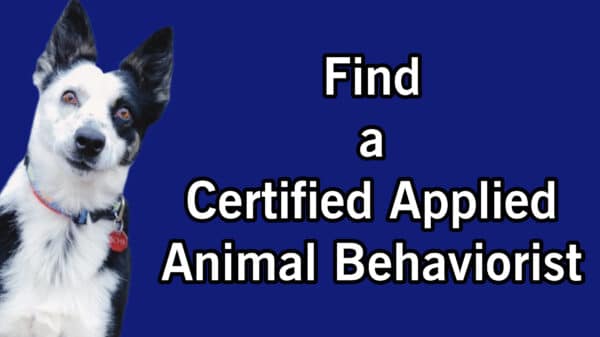Find a Dog Behaviorist Near You
Find the right Dog Behavior Professional for You and Your Dog and Learn More Aboout What Sets Each Professional Apart From One Another. Often These Professionals Colaborate and Work Together as a Team Bringing Each Area of Speciality to Your Dog’s Individualized Behavior and Emotional Challenges
Veterinary Behaviorists
Seeking the expertise of a Board Certified Veterinary Behaviorist is a vital step for pet guardians facing challenging behavioral issues that go beyond the scope of training or behavior modification alone. Veterinary Behaviorists are uniquely qualified veterinarians who have undergone extensive training and certification in animal behavior, in addition to their veterinary medical education. They are the pinnacle of professional help available for addressing complex behavior problems in pets, offering a holistic approach that integrates both medical and behavioral science.
Dog Behavior Consultants
Attaining the status of a Certified Dog Behavior Consultant is a testament to a professional’s unwavering commitment to the apex of knowledge, experience, and ethical conduct in canine behavior enhancement. It symbolizes a pledge to deploy the most humane and effective strategies for addressing intricate behavior problems, all while being anchored in a bedrock of science-based methodologies and ongoing professional development. This cohesive strategy guarantees that certified experts are well-prepared to enact profound and positive changes in the lives of dogs and their guardians, tackling behavioral obstacles with both skill and heartfelt empathy.
The key difference between a dog trainer and a behavior consultant is evident in their areas of expertise and their approach to canine behavior. Dog trainers are adept professionals focused on teaching dogs commands, good manners, and in certain cases, specialized skills for activities like agility or service work. They commonly employ positive reinforcement to cultivate desired behaviors, concentrating on instructing the dog to adhere to specific cues or commands. Dog training generally covers from basic obedience and socialization to addressing routine issues such as excessive jumping or leash pulling.
Conversely, behavior consultants engage in a deeper exploration of the mental and emotional facets of canine behavior to tackle more intricate behavior problems. This encompasses addressing severe concerns like aggression, anxiety, phobias, and compulsive behaviors. Behavior consultants investigate the root causes of these issues, often linked to emotional distress or environmental triggers, and formulate tailored, in-depth behavior modification strategies. Their holistic approach takes into account the dog’s surroundings, health status, historical behaviors, and the dynamics of their relationship with their guardians to forge sustainable solutions. Although both professions strive to enhance the well-being of dogs and their guardians, behavior consultants are specialized in unravelling the more complex behavioral issues with an evidence-based, scientific comprehension of animal behavior.
For pet guardians seeking assistance for a dog with behavioral challenges, it is critical to assess the credentials of the professional they are considering. Asking about their academic background and certifications can help ensure that the consultant or behaviorist possesses the requisite depth of knowledge to effectively navigate and resolve intricate behavioral issues. Both roles are crucial in the animal behavior field, offering unique perspectives and methodologies for enhancing canine lives and fostering stronger bonds between dogs and their guardians.
Animal Behaviorists
A Certified Applied Animal Behaviorist (CAAB) is a professional with advanced academic training in animal behavior and extensive experience in applying their knowledge to solve behavioral problems. CAABs are distinguished by their scientific approach to understanding and modifying animal behavior, making them highly sought after for their expertise in both research and practical behavior modification. Here’s an overview of what a CAAB is, their qualifications, the path to becoming one, and why someone might seek their services.
Certified Canine Behaviorists

A Certified Canine Behaviorist (CAB-ICB) Full membership
Certified Canine Behaviorists, Full members (CAB-ICB) of International Canine Behaviorists are expected to:
- Have a recognised academic qualification in canine behaviour, such as the level 5 Advanced Diploma in Canine Behaviour Management from Compass Education Ltd, or knowledge equivalent to a level 5 qualification as minimum
- Have hands-on experience in the field of canine behaviour and training
- Have excellent knowledge of dog behaviour, psychology and the physiology of the dog
- Understand all variables that influence behaviour, from diet and nutrition through to health issues and environmental issues that may manifest in behaviour changes
- Understand and comply with the constraints of the Veterinary Surgeons Act, when they cannot advise clients and when it is necessary to refer the client back to the veterinary surgeon for further investigation
- Understand the different drugs commonly used by vets, their contra indications and how they may affect behaviour
- Understand complementary therapies such as chiropractic and hydrotherapy and when these might be appropriate (advising the owner to speak to their vet), and liaise with other professionals as and when necessary as part of a team for the benefit of the dog
- Carry out behaviour consultations on veterinary referral, when necessary, make behavioural diagnoses, and liaise with veterinary surgeons and clients in a professional manner
- Deal with all of types behaviour problems from separation anxiety to aggression,
- Be able to write an in depth tailored behaviour modification report to a client and a professional letter to the veterinary surgeon
- Identify any welfare issues with the dog and go to the appropriate authority if necessary
- Demonstrate a good knowledge of products and equipment available, know when to recommend and which ones to avoid
- Have a thorough understanding of dog law and how it applies to the client
- Use fear free training methods only, upholding ICB’s motto of ‘welfare never compromised’
- Have a ‘learning never stops’ attitude and a willingness to share knowledge for the benefit of other members, such as:
Actively participate in the private ICB Facebook forum discussions for the benefit of all members
Actively participate in the public ICB Facebook forum and support the ‘public face’ of ICB - Members should be able to identify times when they need additional help and advice from colleagues
- Attend regular training and educational events in order to keep up to date in the fast-changing world of behaviour
- Contribute to the education of other members through book reviews, website blogs and webinars
- Keep accurate records taking into consideration the Data Protections Act
- Demonstrate excellent written and verbal communication skills, conducting themselves in a professional manner at all times
To be offered full membership, you will need to submit a minimum of 1 case study and have an observed consultation (either in person or via Skype or a video recording can be submitted)



